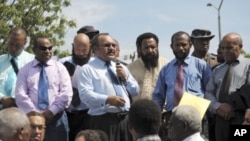Papua New Guinea is in the midst of a political standoff, with two rival politicians claiming to be prime minister. With one backed by the country's cabinet, the other by the supreme court, analysts say the country is heading into unchartered waters, with a resolution hinged on a dangerous ego battle.
Michael Somare, Papua’s New Guinea’s longtime on-and-off leader, was sworn in as prime minister on Wednesday morning after the Supreme Court ruled the current government is unconstitutional.
But, his rival Peter O’Neill, who won a parliamentary election in August, maintains he is the country’s legitimate leader.
The crisis started brewing in April when Michael Somare, 76, left PNG to undergo heart surgery in Singapore. The medical treatment took months and, during his absence, Papua New Guinea’s parliament elected popular opposition leader Peter O’Neill to take his place.
Somare returned home in September fighting to be reinstated, thrusting the troubled Pacific nation into a political deadlock.
Jenny Hayward-Jones, an analyst on Papua New Guinea politics from the Lowy Institute in Australia, says the crisis has become a battle of egos with neither leader willing to step down.
“I think the ambitious nature of both politicians is of concern at the moment," said Hayward-Jones. "Both the competing prime ministers, I don't think they will see their way through to a fair solution quickly. I think this may take some time to convince both of them that they need to talk or that one of them needs to stand down or stand back and allow the other to stand forward and take power.”
Elections are scheduled for June and Hayward-Jones says the leaders are fighting to stay in power so they have access to the cash and resources that will allow them to fund their campaign and secure votes.
With his heavy-handed leadership style and accusations of corruption, many Papua New Guineans have lost faith in both the parliament and leadership of Michael Somare, who has ruled the country on and off for more than forty years.
And, although Somare has the supreme court on his side, O’Neill boasts the support of the parliament and a disillusioned public.
But, with analysts warning that the deadlock is unlikely to be solved swiftly, Hayward-Jones says there are concerns the police may become embroiled in the current political tensions.
“I don't see much likelihood of a military intervention," said Hayward-Jones. "The police, however, are another matter. There are two police commissioners at the moment, one appointed by each prime minister. And, the police themselves are said to be divided into two factions one supporting Somare, the other supporting O'Neill. So if the situation did become violent and there was some public unrest then the police response would become critical.”
The mineral-rich country and former Australian colony has a population of seven million and a rocky political history. But the current power struggle is unprecedented.
